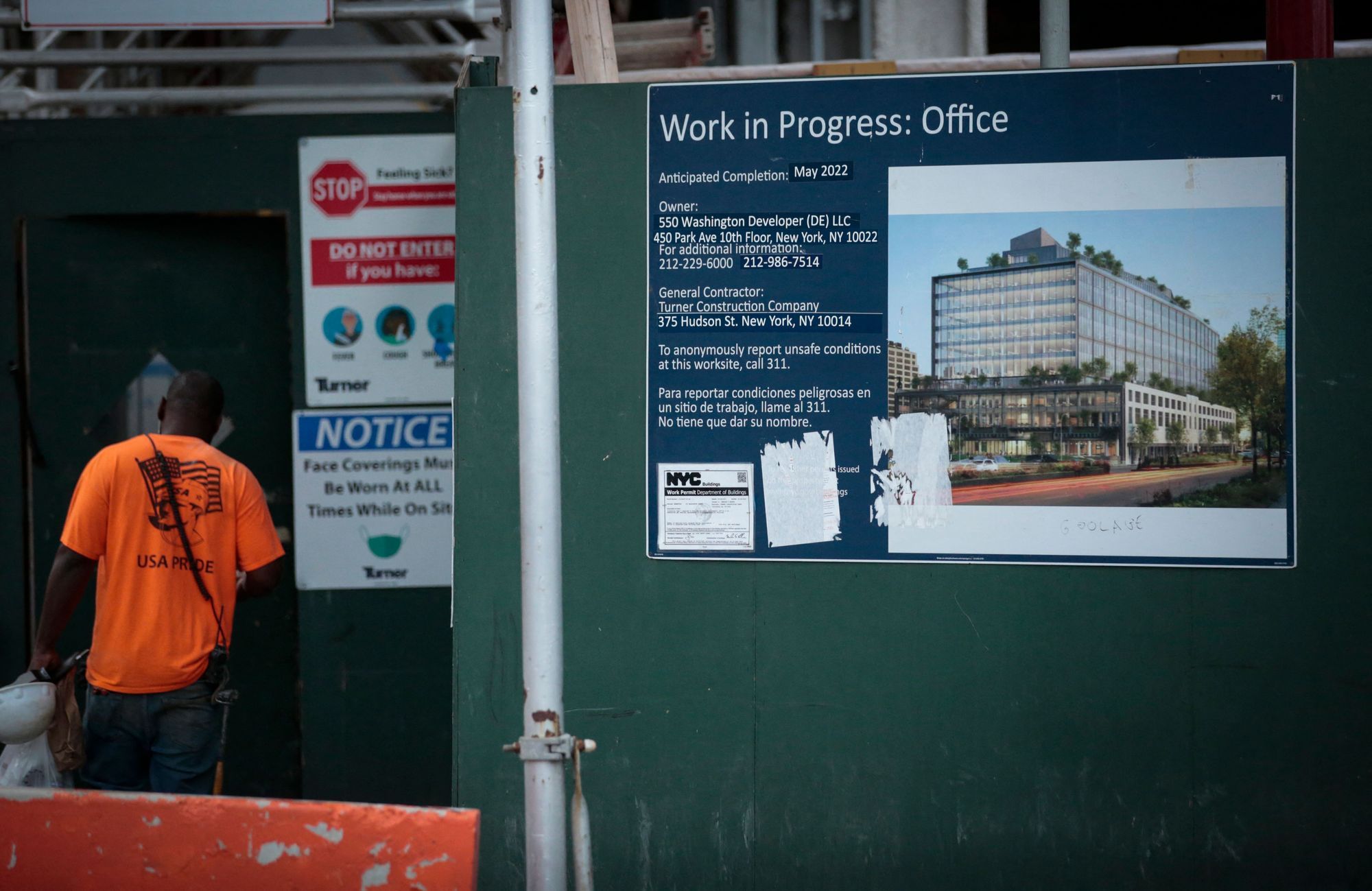The Productivity Panopticon

We've got two great pieces today. One free and one for paid subscribers only.
Ed Zitron has been doing a great job covering the work from home debate over the past year or so at his newsletter Where's Your Ed At, so when I saw this story in the New York Times about companies using software to track "worker productivity," I thought he'd be very pissed off about it. He certainly was!
Ashley Rodriguez who runs the newsletter and podcast Boss Barista about coffee, the service industry, and labor issues, writes on the invisible labor behind coffee production and the burgeoning wave of unionization going on at Starbucks and other cafes around the country. Paid subscribers can jump directly to that one here if you like:

Hell World pays contributors $250-500 per piece. That is about or more than what a lot of very famous sites with big operating budgets pay freelancers, so if you can chip in to help me to pay decently please do so.
If you missed the most recent Hell World it was about the so-called "teacher shortage." It seems to have really struck a nerve.
Defunding all public services to the point where they stop functioning well and can therefore be used as an example of why they should be privatized is almost the entirety of the conservative project. https://t.co/PEs2sPFBUe
— luke (@lukeoneil47) August 17, 2022
And fuck it why not here's another good one from a year ago about the high cost of dying.

While numbers vary state by state, whether you’re insured or not, and on how complicated the delivery itself is, the average cost of having a baby in America ranges into the multiple thousands of dollars if not into the tens of thousands of dollars.
The cost of the other main thing besides being born we’re put here on earth to do — die — isn’t much different.
Setting aside the ridiculous costs of healthcare before we even get to the dying part, what happens after we pass ends up costing the people we leave behind exorbitant amounts as well. Again, depending on the state, the cost of a funeral averages somewhere in the vicinity of $7-$12,000. Swipe the fucking credit card on the way in and on the way out. Toss in the other typical major milestones in a fortunate human’s life — buying a home, getting married and going to school — and the moment of conception starts to look like nothing but a decades long process of accumulating debt merely to exist and function in society.
As Harvey Day writes below “We die as we live, buried in debt.”

Was I there to do work or have my work monitored?
by Ed Zitron
When I was a kid I went to a fancy secondary school in London. Kids would regularly get into trouble in maths for getting a question right, but using the “wrong” method, no matter how fundamentally sound, to get there. This taught us the valuable lesson early on that the British private school system was built to prepare us for a life of making up work for no appreciable gain.
I would be scolded, not because I was wrong, but because I wasn’t the right kind of right.
The same sort of thing happened again and again over the years throughout my career as middle managers demanded to see exactly what it was I was doing at all times, even if I was productive, even if I was producing significantly more than they were. Every time I felt someone standing behind me watching me type, every time I felt my manager watching through the window of their private office, every time I received that “Can you forward me your conversation with the journalist?” email I felt a deep darkness inside of me.
What the fuck was I doing? Was I there to do work or have my work monitored? Was it my work product that mattered, or was it the ability for managers to say “That’s a good one!” and move on with whatever it is they do all day?
I began learning the specific way certain managers’ footsteps sounded, ever ready to switch my performed workflow to match whatever arbitrary thing I knew they thought work was supposed to resemble. None of it was relevant to my actual job, of course. This was just to avoid being reported by the middle management secret police who existed only to protect their own jobs by any means necessary, even if it meant their employees doing worse work for the client.
This, my friends, is modern management.
I only really started writing about labor a year ago on my newsletter, but I soon learned that what I thought was an anomaly in my first few jobs appears to be commonplace based on many of the stories people tell me about their own workplaces. The office was (and I’d argue is) capital prison. It’s a place meant to trap the worker and extract as much out of them as possible, from their labor, yes, but also through the ancillary benefits of making managers and bosses feel important. It doesn’t matter if it works or is profitable or is productive. There is a genuine compensation structure offered in modern business for simpering snitches and power-hungry demagogues that believe that controlling people’s lives and wielding power is even better than making a good business that makes money.
I believe we have been living in the gilded age of the professional tattletale, where con-artist ladder climbing middle managers who did well in school have found the exact minimum amount of job performance they can do themselves as long as they can sustain the appearance of productivity. These people know how to turn the right levers – furrowed brows, late nights at the office, lots of emails, presenting others’ work as their own – to continue to be promoted and be considered a “team player,” all while running their own silent House UnBusiness Activities Committee where they regularly, although subtly, undermine and suppress those beneath them they consider a threat.
Except this is all a performance, and a performance needs a stage and an audience.
Remote work took that away. That means that nasty little productivity goblins couldn’t complete workplace sidequests to enchant the big boss. Once working from home became the norm for many, millions of workplace snitches were set adrift, as there was no obvious way to prove that they actually provided something to the company other than, well, “doing work.”
Thankfully for gutless scumbags everywhere, the New York Times published a well-reported story around workplace “productivity scores” and workplace surveillance last week. It’s a stomach-turning piece that goes through the varying ways that companies are choosing to outright fuck over their workers, with some of them going as far as using “digital productivity monitoring” to judge whether someone should actually be paid:
A few years ago, Carol Kraemer, a longtime finance executive, took a new job. Her title, senior vice president, was impressive. The compensation was excellent: $200 an hour.
But her first paychecks seemed low. Her new employer, which used extensive monitoring software on its all-remote workers, paid them only for the minutes when the system detected active work. Worse, Ms. Kraemer noticed that the software did not come close to capturing her labor. Offline work — doing math problems on paper, reading printouts, thinking — didn’t register and required approval as “manual time.” In managing the organization’s finances, Ms. Kraemer oversaw more than a dozen people, but mentoring them didn’t always leave a digital impression. If she forgot to turn on her time tracker, she had to appeal to be paid at all.
Though this may be a little much, I want to say that any company that installs a system like this or uses it in this way deserves to have their C-suite tossed into solitary confinement.
The idea of paying someone based on the exact minutes they work is entirely antithetical to actual productivity. Nobody works eight hours a day. Academics have been saying this for a long time! It all makes me think that no one interfacing with this software has ever done any real work in their lives.
Some of these systems are simple keyloggers, meaning that every single thing you type, (even if you’ve typed “RafaelDevers Hentai” into DuckDuckGo) is now in your boss’ hands. Some go as far as to actively measure what sites you’re on and how long you’re on them for. In every single case, they’re not measuring how good you are at your job, but whether you’re “working” in the most abstract sense, in the boss-driven platonic form that they believe labor is executed.
This is, of course, not new. Amazon uses some of the most disgraceful workplace surveillance to torture workers. It is relatively new to knowledge workers though, and it’s going to become extremely common in the increasingly large remote workforce. And while you may think that this is just capitalism’s attempt to drain more money and labor from the workforce, I must be clear that it’s also part of sustaining the myth of the Hard Working Boss™. These systems are tuned and tweaked to measure labor based on what bosses and managers that don’t do any real work want to believe work looks like. The reason that they don’t care that it’s onerous and mentally-draining is that they, like many powerful people, have climbed the corporate ladder with the intent of escaping the doldrums of having to do real work. If these useless pencil-pushers can’t be the arbiters of what “work” looks like, they may end up being evaluated themselves on more tangible deliverables such as “What did you actually do?” and “What was created as a result of you doing it?”
Even the inventor of WorkSmart, a time-tracking software company, was so unprepared for the ramifications of constantly tracking workers that he couldn’t use his own software:
Two years after helping to build WorkSmart, Mr. Mazzoli started using it. He became awash in anxiety and doubtful about its accuracy. “Some days you were just moving the cursor around just for the sake of it,” he said. The tool was powerful but dangerous, he concluded. (He left the company a year later.)
In one of my early jobs I remember getting in trouble for spending more than ten minutes squeezing one out in the bathroom, and how one particular manager loved being the bathroom police. As a result, I believe that remote work may have robbed our nation’s middle managers of one of their favorite activities. Thankfully workplace surveillance has brought it back:
Once, he said, a manager asked why his score had dropped during a particular 10-minute increment. “Sometimes I have to use the bathroom,” he replied. (Matthew Hastings, AlphaBrook’s founder and chief executive, said the company “would never assess an employee over just 10 minutes of their time.”) In interviews and written submissions to The Times, workers across a variety of jobs — pharmaceutical assistants, insurance underwriters, employees of e-commerce companies — also said productivity pressure had led to problems with bathroom breaks.
As an aside, restricting people’s access to the toilet in general (but also specifically) as a means of measuring productivity, should be considered criminal and, again, any manager that stops someone pissing should be in jail.
Bullshit Metrics
The New York Times article also crystallizes a larger problem of these systems, which is that they are primarily measuring the workday as a linear continuum of when we are “idle” and when we are “productive.” These are then imprecisely mashed into other metrics – how “engaged” you were with a particular document, how much of your day was spent on the “right” apps or websites, and so on – to come up with a picture that says whether you’re “doing the right work.” It’s fantasy football for middle managers. A way to make them feel like they’re in control and, in some way responsible for your output, because they were smart enough to read the numbers.
All of this is a symptom of the larger problem of management’s disconnection from labor itself. Anyone who has recent and meaningful experience in any job that is being measured in these arbitrary metrics knows that they’re insane. But people are regularly promoted to or hired to be part of management that have no actual experience of the thing they are managing that they have no matrix to evaluate work, and thus they have no real way to say “okay, this person is good at their job.” This is why you see so many astonishingly stupid people promoted. It’s because they're nice, because they look like those promoting them, and because they confirm the biases about the workplace that make those in power sleep well at night.
If you want to call bullshit on any of these products, ask any of the people instituting them how they measure success at a job. If you are pushing people to earn “productivity points,” you have failed as a company. Your management is too disconnected from work to evaluate actual production and outputs, and you are lazy, stupid and overpaid. And if you’re a worker subjected to them, I am 100% in your corner if you use any and all exploits to trick the system into paying you more. Fuck ‘em.
Ed Zitron is the ceo of media relations firm EZPR and writes the Where’s Your Ed At newsletter. He lives in beautiful Las Vegas Nevada

Coffee and invisible labor
by Ashley Rodriguez
I once heard it said that between fifty to one hundred hands touch any given coffee bean before it ever gets to a consumer. Whatever the exact number involved, it’s clear that coffee is an enormously labor-intensive good to produce. Most of the coffee you drink (from small, independent shops to mega brands like Starbucks and McDonald’s) is hand-grown, hand-harvested, hand-picked, hand-sorted, hand-processed, hand-bagged, hand-shipped, hand-roasted, hand-bagged again, and then hand-made.
It’s striking to think about just how many people have to work to get you your morning cup; more so that it still only costs a couple bucks. Once you pan out and reflect on how that pricing is true for so many other food and drink products you consume—fruit, vegetables, tea, rice, chocolate, and so on—a troubling picture begins to emerge.
Of late the customer-facing end of the coffee world is getting a lot of attention for widespread unionizing efforts. My podcast, Boss Barista, has featured interviews from members of barista-led unions since 2018, starting with the workers of Gimme! Coffee in Ithaca, New York. Since then, many others working at small, independent shops have begun to organize, including the baristas at Ann Arbor-based Mighty Good, Tartine Bakery in the Bay Area, and recently, the workers of five Chicago locations of Intelligentsia Coffee. But it was when the first Starbucks unionized in December of 2021 that things starting to really pick up steam...
Subscribe to read the rest here.

